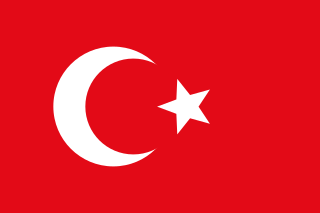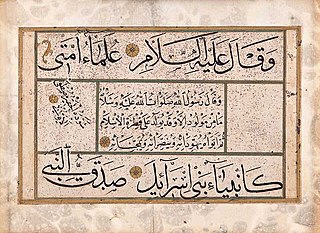
Custodian of the Two Holy Mosques, or Protector of the Two Holy Cities, is a royal style that has been used officially by the monarchs of Saudi Arabia since 1986. The title has historically been used by many Muslim rulers in the past, including the Ayyubids, the Mamluks, the Ottomans and the Sharifain rulers of Hejaz. The title was sometimes regarded to denote the de facto Caliph of Islam, but it mainly refers to the ruler taking the responsibility of guarding and maintaining the two holiest mosques in Islam: Al-Haram Mosque in Mecca and the Prophet's Mosque in Medina, both of which are in the Hejazi region of Saudi Arabia. The Custodian has been named the most powerful and influential person in Islam and the Sunni branch of Islam by The Muslim 500, as well as the most powerful Muslim and Arab ruler in the world.

Alemdar Mustafa Pasha was an Ottoman military commander and grand vizier.
Murat Belge is a Turkish academic, translator, literary critic, columnist, civil rights activist, and occasional tour guide.
Ahmet Köklügiller is a Turkish contemporary writer and influential educationist.

İlber Ortaylı is a Turkish historian and professor of history of Crimean Tatar origin at the MEF University, Galatasaray University in Istanbul and at Bilkent University in Ankara. In 2005, he was appointed as the director of the Topkapı Museum in Istanbul, until he retired in 2012.
Halil İnalcık was a Turkish historian. His highly influential research centered on social and economic approaches to the Ottoman Empire. His academic career started at Ankara University, where he completed his PhD and worked between 1940 and 1972. Between 1972 and 1986 he taught Ottoman history at the University of Chicago. From 1994 on he taught at Bilkent University, where he founded the history department. He was a founding member of Eurasian Academy.

Fazıl Hüsnü Dağlarca was one of the most prolific Turkish poets of the Turkish Republic with more than 60 collections of his poems published as of 2007. He was a laureate of the Struga Poetry Evenings Golden Wreath Award.

Mehmed Emin Namık Pasha was a prominent Ottoman statesman and military reformer, who is considered to be one of the founding fathers of the modern Ottoman Army. He served under five Sultans and acted as counsellor to at least four of them. He founded the Mekteb-i Harbiye, was twice Viceroy of the province of Bagdad, was the first ambassador of the Sublime Porte at Saint-James's Court, was appointed Serasker, he served as the Minister of War, became a Cabinet minister, and was conferred the title of Şeyh-ül Vüzera. During a long career that spanned a long lifetime, he was one of the personalities who shaped, as well as were themselves shaped by, what historian İlber Ortaylı called “the longest century” of the Ottoman state.

Ahmet Ümit is a Turkish author and poet. He is best known for his crime novels.

Circassians in Turkey refers to people born in or residing in Turkey that are of Circassian origin. The Circassians are one of the largest ethnic minorities in Turkey, with a population estimated to be two million, or according to the EU reports, three.

İstanbul Kültür University (İKÜ) is one of the many private universities located in Istanbul, Turkey. It has a total of four campuses all in close proximity to each other in the western part of Istanbul. The three campuses are located in Şirinevler, İncirli, Basın Ekspres and Ataköy This non-profit University was founded in 1997; its Industrial Engineering started in the 1997–98 academic year. The university has five schools and two vocational schools. In 2009, Global Political Trends Center, a policy oriented research institution, was founded under the auspices of the university.
Ibrahim II was a bey of Karaman. In 1425 he married Ilaldi Sultan Hatun, a daughter of Ottoman Sultan Mehmed I. They had six sons among them Ishak Bey, Pir Ahmet Bey and Kaya Bey, who married his cousin Hafsa Hatun, daughter of Murad II, and had a son, Kasım Bey.
Atmeydanı incident was an uprising which occurred at the Hippodrome of Constantinople in Constantinople, the capital of the Ottoman Empire, in 1648.

Nurhan Atasoy is a Turkish art historian. She specializes in history of Ottoman and Islamic art. She served as a chair in the Department of Fine Arts, Archeology and Art History at Istanbul University until 1999 when she retired. She is a resident scholar of the Turkish Cultural Foundation.

The Government of the Grand National Assembly, self-identified as the State of Turkey or Turkey, commonly known as the Ankara Government, or archaically the Angora Government, was the provisional and revolutionary Turkish government based in Ankara during the Turkish War of Independence (1919–1923) and during the final years of the Ottoman Empire. It was led by the Turkish National Movement, as opposed to the crumbling Constantinople Government/Istanbul Government, which was led by the Ottoman Sultan.

Suyolcuzade Mustafa Eyyubi was a 17th-century Ottoman calligrapher.
Özden Örnek was a Turkish admiral. He was the Commander of the Turkish Naval Forces from 2003 to 2005. In 2012 Örnek was sentenced to twenty years in prison for his alleged role in the 2003 "Sledgehammer" coup plan.

Mümtaz'er Türköne,, is a Turkish academic and author. He was a faculty member at Gazi University from 1993 to 2007 and was a columnist for the Zaman and its English-language sister Today's Zaman.
Kadir Mısıroğlu (1933–2019) was a Turkish writer, publisher and conspiracy theorist. He was known for his staunch opposition to the early Kemalist regime of Turkey and advocating the restoration of the caliphate. Mısıroğlu's claims include that Joseph Stalin ordered his army to read the Quran on the sands against the Nazis, William Shakespeare being a secret Muslim, and that Karl Marx's Das Kapital was dictated by Jinn. He penned over 50 books, which include non-fiction, fiction, and poems. His works have been criticized for their approach, awareness and bias.
Erhan Afyoncu is a Turkish historian, writer, academician, television programmer and columnist. Rector of the National Defense University.











